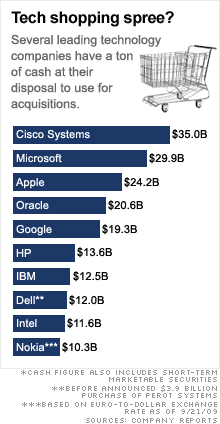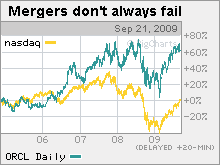Tech companies getting rich quick
Dell and Adobe paid sweet premiums for Perot and Omniture. And more big tech mergers are likely as Microsoft, Cisco and Google all sit on massive piles of cash.


 |
| Oracle has purchased dozens of companies in the past five years -- and the deals have helped boost the software giant's earnings and stock price. |
NEW YORK (CNNMoney.com) -- Technology stocks have outperformed the broader market during the past six months -- and with good reason.
Many leading techs, such as Apple (AAPL, Fortune 500) and Google (GOOG, Fortune 500), have continued to report solid results in spite of the weak economy. But now there's yet another reason to like tech stocks: a wave of mergers appears set to swoop over the sector.
Dell (DELL, Fortune 500) announced Monday morning that it was buying computer services company Perot Systems (PER) for $3.9 billion in cash. The purchase values Perot at $30 a share, a whopping 67.5% premium to Friday's closing price.
The Dell deal comes just a week after Adobe stunned Silicon Valley and Wall Street with the news that it was acquiring Web analytics firm Omniture for $1.8 billion, or $21.50 a share. That was a 24% premium.
The pace of takeovers overall has started to pick up. But there's reason to believe that there could be many more tech deals to come. That's because, in addition to being able to use improving stock prices as acquisition currency, several leading tech firms are sitting on mountains of cash.
Cisco Systems (CSCO, Fortune 500), which has never been shy when it comes to mergers, has $35 billion. Microsoft (MSFT, Fortune 500) has nearly $30 billion while Apple and Google each have about $20 billion.
One tech fund manager said there's no need to amass that sizeable of a cash horde unless you are willing to eventually use it on dividends, stock buybacks or acquisitions.
"This is the tip of the iceberg in terms of consolidation over the next few years. The biggest companies are all positioning themselves to capture as much of the tech spending as they can and they all have a lot of cash as a resource," said Ken Allen, manager of the T. Rowe Price Science & Technology fund.
Allen said that software firms McAfee (MFE), Salesforce.com (CRM) and Red Hat (RHT) could be compelling targets for a larger software firm. He also said that Palm (PALM), the maker of the popular new Pre smartphone, could also be of interest to a bigger tech company.
Chris Armbruster, a senior research analyst with Al Frank Asset Management, in Laguna Beach, Calif., agreed that more tech deals are likely in the next few months since so many of the tech leaders have such strong balance sheets. In addition, smaller companies may find that the time is now right to sell given the increased interest by larger tech firms.
"It wouldn't surprise me if the merger trend continues. There are still a lot of companies that have cash to put to work," Armbruster said. "Generally, a lot of tech firms that are in cyclical downturns could be good targets for companies looking to gain market share."
Armbruster said his firm doesn't invest in stocks just because they might be takeover targets. But he said that two tech stocks his company owns, software firm Synopsys (SNPS) and communications-equipment maker BigBand Networks (BBND), would be "digestible" if another company wanted to buy them.
Mergers obviously are a plus if you are a shareholder in a smaller company getting taken out for a big premium. But should investors be wary if a larger tech company they own starts to go shopping?
To be sure, mergers have been viewed skeptically by many investors. There have been some high-profile examples of companies in other industries stumbling because of poor acquisition decisions. But that hasn't been as much of a problem in technology.
IBM (IBM, Fortune 500), for example, has done a solid job with many of its software acquisitions. Cisco and HP (HPQ, Fortune 500) have also had few merger-related headaches in the past few years.
And then there's Oracle. Since the beginning of 2005, Oracle chief executive officer Larry Ellison has almost single handedly kept tech M&A bankers employed, scooping up PeopleSoft, Siebel Systems, Hyperion Software, BEA Systems and, most recently, Sun Microsystems.
During this time frame, Oracle's stock has gained 65%, compared to just a 2% increase in the Nasdaq.
So all mergers aren't doomed to flop. And investors can profit by sticking with tech companies that have a proven track record of making deals work.
"When a company relies on growth through acquisitions, you have to pay attention to the skills of the management," said Stephen Mergler, president of Northstar Capital Management, a Palm Beach Gardens, Fla., investment firm that owns shares of several big techs that have done a bunch of deals, including Oracle, IBM, HP and Google.
Allen said that more companies are likely to follow Ellison's lead. The Sun deal does clearly illustrate that the leading tech firms are trying to position themselves as a proverbial one-stop shop -- particularly for large corporate customers.
Dell's purchase of Perot, which will finally give it a bigger foothold in tech consulting and enable it to compete more effectively against IBM and HP, is also evidence of this trend. It may no longer be relevant to refer to a tech company as just a software or hardware maker.
"There is such an increasing overlap in technology businesses. The lines are getting blurred," Allen said. "Companies worry that if they don't do deals, their competitors will."
The risk, however, is when a company overspends or makes a purchase that just doesn't fit the company's strategy. Some think that might be the case with Oracle and Sun, for example. Mergler said he's not worried about that deal but agreed that the key thing to watch out for is when a company starts biting off more than it can chew.
"There's no bigger warning sign than executives not being able to integrate deals or doing mystery acquisitions that don't make sense," Mergler said.
Talkback: What should big techs like Microsoft, Cisco and Google do with all their cash? Should they use it for takeovers or reward investors with dividends and stock buybacks? Share your comments below. ![]()

